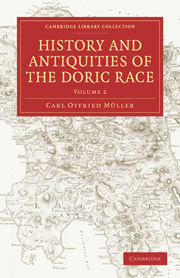Book contents
- Frontmatter
- Contents
- Map
- BOOK III POLITICAL INSTITUTIONS OF THE DORIANS
- CHAP. I
- CHAP. II
- CHAP. III
- CHAP. IV
- CHAP. V
- CHAP. VI
- CHAP. VII
- CHAP. VIII
- CHAP. IX
- CHAP. X
- CHAP. XI
- CHAP. XII
- BOOK IV DOMESTIC INSTITUTIONS, ARTS, AND LITERATURE OF THE DORIANS
- APPENDIX VI
- APPENDIX VII
- APPENDIX VIII
- APPENDIX IX
- Index of subjects
- Index of authors
- ADDITIONS AND CORRECTIONS
CHAP. VI
Published online by Cambridge University Press: 05 August 2011
- Frontmatter
- Contents
- Map
- BOOK III POLITICAL INSTITUTIONS OF THE DORIANS
- CHAP. I
- CHAP. II
- CHAP. III
- CHAP. IV
- CHAP. V
- CHAP. VI
- CHAP. VII
- CHAP. VIII
- CHAP. IX
- CHAP. X
- CHAP. XI
- CHAP. XII
- BOOK IV DOMESTIC INSTITUTIONS, ARTS, AND LITERATURE OF THE DORIANS
- APPENDIX VI
- APPENDIX VII
- APPENDIX VIII
- APPENDIX IX
- Index of subjects
- Index of authors
- ADDITIONS AND CORRECTIONS
Summary
The gerusia of Sparta, Crete, and Elis; and the kings of Sparta and other Doric states.
1. This result was chiefly brought about by the aristocratical counterpoise to the popular assembly, the gerusia, which was never wanting in a genuine Doric state, the “council of elders,” as the name signifies. In this respect it is opposed to the senate (βουλὴ,) which represented the people; although the latter name, as being the more general term, is sometimes used for the council, but never the converse. Thus in the Persian war a senate assembled at Argos, which had full powers to decide concerning peace and war; this was therefore of an aristocratic character, since the government of Argos had not then become democratical. The Homeric assembly, which was of a purely aristocratical form, is called βουλὴ γερόντων or γερουσία; it consisted of the older men of the ruling families, and decided both public business and judicial causes conjointly with the kings, properly so called, frequently however in connexion with an ἀγορά. In this assembly lay, but as yet undeveloped, the political elements of the Doric gerusia. At Sparta the name was taken in the strictest sense, as the national opinion laid the greatest importance upon age in the management of public affairs; the young men were appointed for war: and accordingly none but men of sixty or more years of age had admission to this council.
- Type
- Chapter
- Information
- History and Antiquities of the Doric Race , pp. 94 - 114Publisher: Cambridge University PressPrint publication year: 2010First published in: 1830



